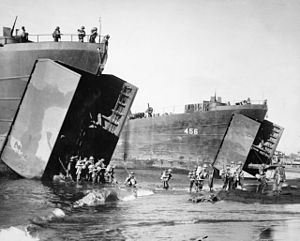| Landing at Lae | |||||||
|---|---|---|---|---|---|---|---|
| Part of World War II, Pacific War | |||||||
 Australian troops disembarking from American Landing Ships, Tank (LST), including LST-456, at Red Beach | |||||||
| |||||||
| Belligerents | |||||||
|
|
| ||||||
| Commanders and leaders | |||||||
|
|
| ||||||
| Units involved | |||||||
| VII Amphibious Force | |||||||
The Landing at Lae was an amphibious landing to the east of Lae and then the subsequent advance on the town during the Salamaua–Lae campaign of World War II. Part of Operation Postern, which was undertaken to capture the Japanese base at Lae, the landing was undertaken between 4 and 6 September 1943 by Australian troops from the 9th Division, supported by US naval forces from the VII Amphibious Force. The first major amphibious operation undertaken by the Australian Army since the failed Gallipoli Campaign, the Australians invested a significant amount of effort into planning the operation.
The initial landing saw one brigade and supporting elements being landed at two beaches about 27 kilometres (17 mi) east of Lae. Once this brigade had secured the beachhead, a second brigade was landed to follow them up and help expand the beachhead. In the days following the landing the division's third and final brigade was brought ashore. The landing was carried out in conjunction with the airborne landing at Nadzab, and was followed by a drive on Lae by the 7th Division from Nadzab and the 9th from the landing beaches, which advanced with two brigades while one held the landing beach. Hampered by bad weather, logistical difficulties, and stiff resistance by the Japanese defenders, the 9th Division's advance stalled and ultimately troops from the 7th Division entered Lae first, entering the town on 16 September, the day before the 9th.
